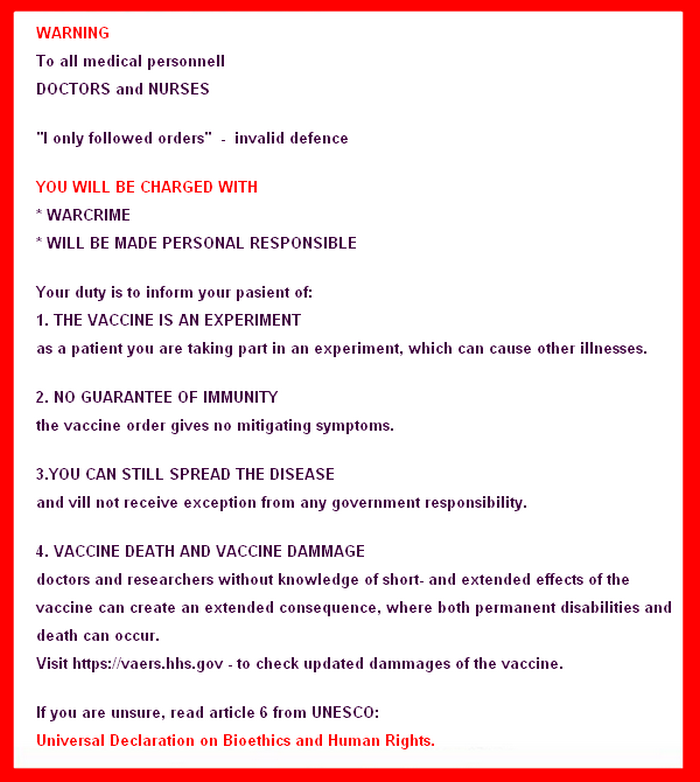‘I’m a doctor and I fear we will never regain the public’s trust after Covid’

NOVEMBER 10, 2021 GEOPOLITICS
One undeniable outcome of the pandemic is that the public’s faith in scientific and medical authorities is perhaps at its lowest point in living memory – and no objective observer can truly be surprised.
At the beginning of the Covid-19 pandemic, the US President’s Chief Medical Adviser Dr Anthony Fauci and US Surgeon General Dr Jerome Adams told us not to wear masks, until they instructed us to wear one everywhere we went.
The Covid vaccines were declared to be effective at preventing the spread of disease, until breakthrough cases around the globe proved that wasn’t so, and that effectiveness was downgraded to “against hospitalization and death.”
Both The Lancet and the New England Journal of Medicine, two of the most prestigious medical journals in the world, have issued embarrassing retractions to widely publicized papers eventually found to have too little validity to be published.
Anyone who suggested that the pandemic originated in a Wuhan laboratory and not a Chinese wet market was labeled a conspiracy theorist by official sources who later had to admit they were possibly correct. The same proved true for everyone who accused Fauci and the National Institutes of Health of funding gain-of-function research at the lab: they were crazy, until they were right.
The US Centers for Disease Control and Prevention and the American College of Obstetricians and Gynecologists urged all pregnant women to be vaccinated, asserting that the new injections were completely safe. Now, a new review of that same data suggests that one in eight women spontaneously aborted her pregnancy after getting the jab.
Even medical terms – such as ‘herd immunity, and the word ‘vaccine’ itself – have literally been redefined over the past few months.
All this has shocked a great number of informed, educated people around the world. Should it, though? In fact, a brief glance through the history of science demonstrates that scientists being completely and utterly wrong – in retrospect, often comically so – is the norm, not an aberration. It’s long past time for modern scientific researchers to discover a proper sense of humility and to step down from the pedestal of secular priesthood they’ve ascended.
Stories about an advisory panel’s recommendation to the Food and Drug Administration to approve a Moderna booster shot contained a quote that most might find truly incredible. “It’s more a gut feeling rather than based on really truly serious data,” said biochemistry professor Dr Patrick Moore. “The data itself is not strong, but it is certainly going in the direction that is supportive of this vote.”
How can a scientific advisory panel make such a recommendation while admitting it’s based on feeling, not fact? In fact, it happens all the time. ‘Medical consensus’ is a term that carries an authoritative denotation, yet it simply means that a bunch of experts got together and decided amongst themselves what’s correct.
The problem is that, today and in the past, those experts – in virtually every field – are so often wrong.
Climate data has been gathered and climate modeling performed for almost a century now, and dire predictions have proceeded accordingly for 50 years. Famines would hit the United States in the 1970s; a new ice age would freeze the globe, while energy demand would boil rivers dry; the depletion of the ozone layer would lay waste to life on Earth. Perhaps the most dramatic was the promise in 1969 that “everybody will disappear in a cloud of blue steam in twenty years.” These doomsayers were highly trained scientists from major universities and national research centers, not street-corner cultists wearing cardboard signs. Nevertheless, the deadlines passed without apocalypse.
Joseph Priestley discovered oxygen in 1774 and nitrous oxide soon after, cementing his rightful place in the history of science. His great discovery was made in the course of his pursuit of phlogiston theory; in fact, he initially called oxygen “dephlogisticated air.” For about a century, from the 1660s to the 1770s, fire was thought by the scientific community to be the result of combustible materials emitting a substance or essence called phlogiston. Very few readers are likely to have heard of phlogiston theory, and even a schoolchild might chuckle at the idea, but Priestley would have vehemently argued for his position, delivering treatise after treatise defending the gospel of phlogistons.
A Greek physician (to gladiators Marcus Aurelius and his son Commodus, for those familiar with the film) named Galen developed a comprehensive understanding of human anatomy in the 2nd-century Roman Empire. His studies improved medical knowledge, certainly; for example, Galen showed that vessels carried blood, and not air, which overturned 400 years of physiological theory. His anatomical and physiological ideas were considered authoritative and went uncontested by students of medicine for 1,300 years. However, in the 1500s, Andreas Vesalius, a Flemish physician and anatomist, realized Galen had derived much of his ‘knowledge of human anatomy from apes and pigs. Abandoning Galen and redoing the work himself, this time on actual human cadavers, he wrote and illustrated the first modern anatomy textbook and erased Galen from medical training (though not history).
medical theories once broadly considered true and now seen as incomplete, inaccurate, or utterly fictional with no tether to reality whatsoever, is extraordinarily long. Naturally, modern researchers will argue that those past scientists were wrong, but we know better now, and scientists today are promoting and teaching accurate information.
Are they?
Have the experts been right on Covid-19, or have they littered the past two years with unfulfilled predictions, bad advice, and misinformation? Are there any true ‘experts’ on a novel disease at all?
What else are we being told is ‘scientific fact’ that future generations will chuckle at while shaking their heads?
Anthropogenic climate change that will wreak untold havoc unless the jet-setting governments of the world can have more of your money and control over your lives?
Gender theory that relegates chromosomal and biological reality to an incidental genetic quirk that must be corrected by hormone therapy and surgery?
Uniformitarianism – Hutton’s and Lyell’s presupposition that Earth’s geologic features are a result of the same gradual processes seen today, and not singular catastrophes – which forms the bedrock foundation of modern geology?
The cursorial theory of bird evolution, at the moment dominant over arboreal theory, that leads to such eye-popping declarations as “the hummingbird is the smallest dinosaur”?
The popular understanding and perception of dinosaurs in general, largely created by artist renderings and pure paleontologist guesswork from fossilized partial skeletons?
Darwinian evolution, dependent on trillions of mutations that both add de novo genetic information and impart a survival benefit, despite no such mutation, in any organism, ever being described?
In some circles, both academic and cultural, even questioning one of these ‘scientific facts’ will result in ostracism and derision. That’s always been the dominant attitude of any consensus of scientists, and one imagines it likely always will be. Considering the current and growing misgivings of the trustworthiness of scientific and medical authorities, perhaps two pieces of advice might be useful.
First, to the general public: science is a process of epistemology – that is, how things can be known – which is incredibly useful, but limited in scope. The scientific method depends on an experiment being repeatable and measurable. Hence, scientific inquiry is definitionally limited to the present and the material. Beware any ‘scientific expert’ making dispositive assertions about the past or the future and attempting to shout everyone else out of the room.
Second, to physicians, researchers, and the scientific and medical communities at large: approach your roles with some humility. Even children have immediate access to pocket computers, with libraries of information. Yes, that includes piles of misinformation that need to be corrected. That said, you do no one favors, yourselves most of all, when you overstep the bounds of experimental knowledge and adopt the roles of priests, prophets, and oracles. Your collective lack of humility, as we’ve seen over and over in the context of Covid-19, can result in real harm.
For the public to regain its faith in science, scientists must cast off the arrogant authority that at this point is tattered and torn anyway.
R. M. Huffman is a physician, author, and observer of culture.
You can actually participate in the global efforts to cripple the Deep State organized criminal cabal's ability for genocide while enjoying healthcare freedom at the same time, by boycotting Big Pharma for good.

COPYRIGHTS
Copy & Paste the link above for Yandex translation to Norwegian.
WHO and WHAT is behind it all ? : >
The bottom line is for the people to regain their original, moral principles, which have intentionally been watered out over the past generations by our press, TV, and other media owned by the Illuminati/Bilderberger Group, corrupting our morals by making misbehavior acceptable to our society. Only in this way shall we conquer this oncoming wave of evil.
Commentary:
Administrator
HUMAN SYNTHESIS
All articles contained in Human-Synthesis are freely available and collected from the Internet. The interpretation of the contents is left to the readers and do not necessarily represent the views of the Administrator. Disclaimer: The contents of this article are of sole responsibility of the author(s). Human-Synthesis will not be responsible for any inaccurate or incorrect statement in this article. Human-Synthesis grants permission to cross-post original Human-Synthesis articles on community internet sites as long as the text & title are not modified